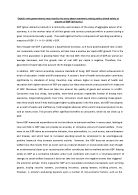Why might a given increase in real GDP not accurately reflect an increase in living standards?
Why might a given increase in real GDP not accurately reflect an increase in living standards?
In brief, measuring the Gross Domestic Product (GDP) of a country is a way of calculating economic activity in the region. There are three ways a government can take the GDP of its country; by measuring the monetary value of its income, output or expenditure. However, the value of the normal ‘nominal GDP’ depends on not only the actual quantity of goods but the prices of goods as well, and this can largely be affected by inflation or deflation. Therefore, adjustments are made to the nominal GDP based on price changes to make the ‘real GDP’, a more accurate measure of economic activity. It is a common misconception that the real GDP is an indicator of not only economic well being but also of standards of living. Unfortunately, inflation and deflation are not the only reasons why the GDP might not reflect how a society is faring and even real GDP might not indicate actual standards of livings in a country.
The reported growth in real GDP largely depends on the government and the accuracy of their statistics and calculations and even if a government is extremely careful in their data collection and calculations, there will be economic activity that will not be measured. Shadow economies, also known as underground economies or black markets, are extremely prominent especially in countries in which production taxes are high. Markets in these economies do not declare their economic output usually either to avoid being taxed or because its goods have been banned. If there are markets that the government are not aware of and thus cannot measure, the real GDP that the government declares will not be accurate. Often there is also non marketed output in an economy, where there is no official transaction between suppliers and consumers and therefore, no record of economic activity. For example, if a person cuts firewood and gives some firewood to his friend. There is still a transition of goods from suppliers to consumers but it is not official or recorded and there are often no prices on part of the consumers. Similarly to the consequences of a shadow economy, if economic transactions are not recorded and declared, the government cannot report an accurate representation its country’s economic activity.







![Rising unemployment and inflation commentary. The above article Bah Humbug talks about the rising inflation accompanied with the rise in unemployment. Inflation is defined as [iii]A persistent increase in the Average Price level in an Economy an](https://mbt-essays-prod-public.s3.eu-west-1.amazonaws.com/933097/listing/933097_1.jpg)